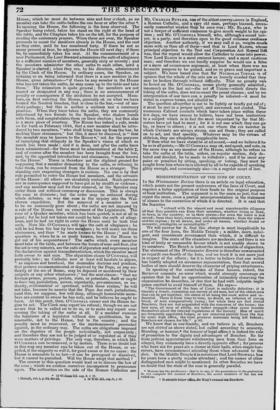MISREPRESENTATION OF THE INNS OF COURT.
IN the Westminster Review there is an article on legal education, which points out the present uselessness of the Inns of Court, and requires .a better application of their funds to the original purpose of their institution. The argument is in the main so just, that we regret the more, even a partial misrepresentation in the statement of abuses to the correction of which it is directed. It is said that the Societies . . . . " extract with the utmost and most reprehensible diligence all that they possibly can from their members, whether living or dead, in town, in the country, or in their graves—for even the tomb is not sacred ; from their heirs, executors, and administrators; from the widow andthe orphan ; by all means, and under all names, whether feudal or monastic, intelligible or unintellifrible."
We will answer for it, that this charge is most inapplicable to one of the four Inns, the Middle Temple ; a milder, more, indul- gent, and considerate government than which, it is difficult to imagine. The rents of the chambers are moderate, and there is no kind of lenity or reasonable favour which is not readily shown to its members. The Bench is indeed the most amiable of oligarchies. The statement of the Westminster Review is therefore unwarranted as regards one-fourth of the Inns, and we trust it is not more just in respect of the others ; for it is better to believe that one writer has hastily adopted an erroneous representation, than that several bodies of men should deserve the character of griping extortioners. In speaking of the constitution of these houses, indeed, the Reviewer commits an error which would strongly encourage an opinion that he had no opportunities of intimately observing the organization he describes, or else that he had with culpable negli- gence omitted to avail himself of them. He says- " The Government of the Inns of Court is radically defective : it is literally a Senate, consisting not merely of old men, but of the oldest men that can be got together, the oldest of all being the most active and in- fluential. There is from time to time, no doubt, an infusion of young blood, of men comparatively young ; but when they are first elected Benchers, they are not acquainted with the concerns of the house ; the best men, all men of ability, are better engaged—they never trouble themselves about the internal regulations of the Society. Men of merit are frequently appointed Judges, or are removed entirely from the Inn by some high office, the least precious materials being left behind ; Benchers are chosen for life." p. 89.
. We know that in one Society, and we believe in all, Benchers are not eleUed as above stated, but called according to seniority. Standing, or honour,* the honour of legal office,t is indeed the rule of promotion to the dignity and advantages of Bencher. So far from judicial appointments withdrawing men from their Inns as alleged, they commonly have a directly opposite effect ; for persons who have not for years ate a dinner in their halls, when simple bar- risters, have recommenced attending them when advanced to the dais. In the Middle Temple it is notorious that Lord STOWELL has for years been a pretty regular attendant ; and the names of other distinguished men might be mentioned. In other Societies we have no doubt that the state of the case is generally parallel.
* Honour has the preference : that is to say, if the promotions in the profession do not complete the number of Benchers, the senior members of the Inn au) called up. t It Wends below ace, for likars counsel are Bombers.


















 Previous page
Previous page